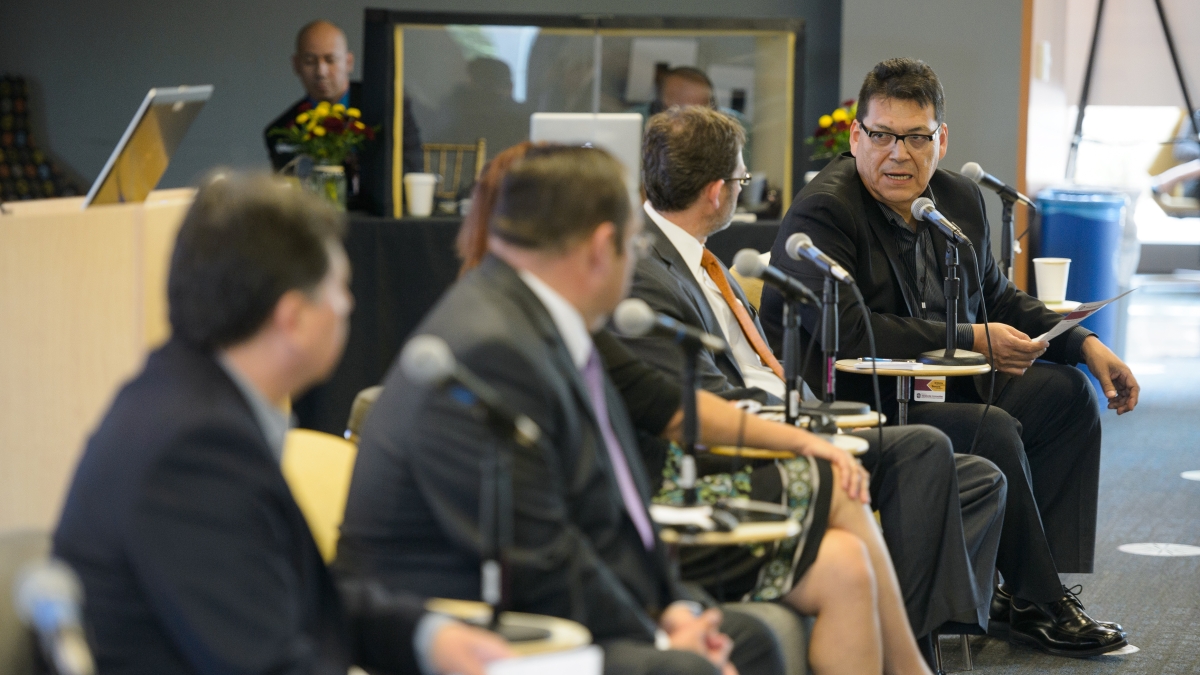Experts discuss need for cross-border collaborations in higher education, research

University presidents and faculty, international leaders and experts in the field convened at Arizona State University to discuss the role that higher education and research institutions play in advancing quality of life, education, sustainability and economic development in the Arizona-Sonora region.
The Arizona-Sonora Colloquium at ASU's McCord Hall on May 20-21 kicked off with a keynote address by ASU President Michael M. Crow, who noted that the university’s brand-new charter establishes the importance of the institution’s local impact and social embeddedness.
“ASU is an institution built around inclusion versus exclusion and the success of the students that we include. And what that means with the level of socioeconomic diversity that we have in this part of the U.S. and the level of ethnic diversity we have in this part of the U.S. is that the institution is not successful unless it is in its entirety representative of the entire socioeconomic diversity of this region,” Crow said.
One way of ensuring that is through the development of collaborations among the many universities and centers for research and innovation within the Arizona-Sonora region.
Attendee and panel speaker Pablo Wong Gonzalez, general director of public research institution Centro de Investigacion en Alimentacion y Desarrollo, noted the importance of maintaining awareness of existing collaborations while creating interest in developing new ones.
“We need to complement each other, to help each other. I think we need to have a global vision with a local focus,” he said.
Speakers at the colloquium’s closing roundtable discussion pointed out how such issues as water scarcity and immigration affect the entire region, regardless of where the “real border” between the U.S. and Mexico is, which only highlights the importance of working together.
“This all has to do with the well-being of the region overall,” said Heriberto Grijalva Monteverde, rector of Universidad de Sonora.
Jim O’Brien, senior vice president of University Affairs and chief of staff to President Crow at ASU, laid out some simple steps to achieve that overall well-being: identify project areas, create an agenda of issues important to the region, and hold each other accountable for working toward those goals together.
“We can do more when we work with others than when we try do it alone,” O’Brien said. “It’s too big a task to take on water issues alone, to take on education alone, to take on social issues of the region alone. We need partners, and we’re committed to taking advantage of this opportunity to build new partnerships.”
After the closing roundtable discussion, Francisco Lara, associate professor in ASU’s School of Transborder Studies, fielded questions from attendees on topics such as health and involving the private sector in collaborations.
“We have to try new things,” Lara told the crowd. “We should not be afraid of failure. We have to work together. We have to think of the region.”
The Arizona-Sonora colloquium is coordinated by the ASU Program for Transborder Communities (PTC) of the School of Transborder Studies and the College of Liberal Arts and Sciences, in collaboration with the Universidad de Sonora (UNISON), the Centro de Investigación en Alimentación y Desarrollo (CIAD) and El Colegio de Sonora (COLSON). The colloquium is also supported by ASU’s Mexico and Latin America Initiatives at the Office of University Affairs.